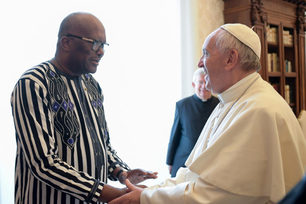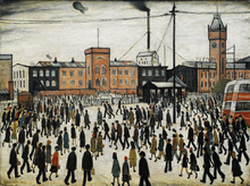
The BBC’s African correspondent, Lamine Konkobo, comes from Burkina Faso and described this tolerance as being “wired into the social fabric of the country, with many people drawing their faith from more than a single creed.” So the Islam and Christianity that is practised there, for example, includes many animist practices such as beating a traditional drum at celebrations of the festival of Eid. Konkobo talks of how he “grew up with people with differing religious beliefs - playing together, being told off by each other's parents, celebrating each other's festivals, mourning each other's deaths, with humanity as the overriding connector common to all”. It was a society so socially connected there was no way for religion to play a divisive role. Was this because, as he suggests “most people feel stronger ties to their extended family and ethnic group, than their religion.”
This struck a chord with me. Do we give too much importance to our religion? Should religion define our identities? There would have been a time in the past when religion, culture and identity were so intertwined that people were not aware of being religious. What we call religion would have been the rituals by which they celebrated rites of passage, the stories that bound them together in community, the way they perceived life and their place in the here and now as well as the hereafter. This would have been the case with Hinduism.
Hinduism is recognised more as a family of religions than one systematised, organised philosophy. Different rites and beliefs grew up depending on location, education, status in society. What we now call Hinduism was simply the many and varied ways in which the people of India lived. They didn’t know they were Hindus and only came to identify themselves as such after the Muslim invasion which introduced them to a different way of life. Indians only came to recognise themselves as having a separate religion when they could compare themselves with another. Many other faiths did this from their very foundations. The Buddha set out a way of life different from the Hinduism of his time, the followers of Jesus established a way of life which increasingly came to be differentiated from Judaism, Islam was established in opposition to the pagan culture of Arabia in the time of the Prophet Mohammed.
It’s unlikely that the founders of these religions were setting out to establish a new religion. Rather they were trying to get to the heart of what their own religion was about, renew it and give fresh meaning to it. But the religions grew and developed their own systems and institutions which were only understood in comparison to others. The ‘new’ religion was in many ways seen as superior to the previous one. It possessed a truth the other didn’t have, a truth that should be passed on. Religions seem to contain within themselves a sense of competition which might well be the basis for mission and proselytization, an element by which they set themselves apart in opposition to others – approaches that contain within themselves the seeds of violence.
So is the answer not to take our religious identity too seriously? Or is it to get to the heart of what religions should surely be about – giving us a framework for living a meaningful life, a practice to help us with the struggle of what it means to be human and a way of relating to others that will help us live in a harmonious society. It would seem that the people of Burkina Fasso have been doing this well. They recognise bonds of humanity, family, culture, nationhood, citizenship that transcend religious difference. They are confident in their religion, allow for difference and maybe even rejoice in it but also recognise other ties that are as important if not more important than religion. But this is being sorely tested by attacks from militant Islamists so that the future of peaceful co-existence is being questioned. There is a danger that increased violence, the fear of the imposition of Sharia Law, the stress on one religious identity over another will lead to an unhealthy recognition of difference and people becoming suspicious of one another. This must not happen. Please God the President’s visit to the Vatican last year will underline how much the tolerance of Burkina Faso is noticed, valued and respected and will have been a motivation for the Government of the country to work hard to maintain it.



 RSS Feed
RSS Feed
